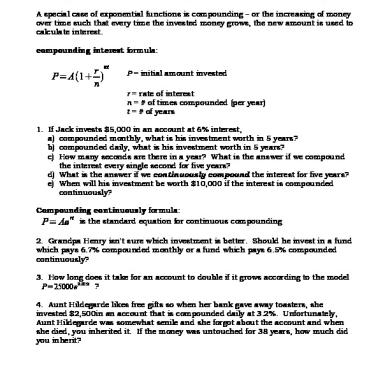Compound Interest Problems
This document was uploaded by user and they confirmed that they have the permission to share it. If you are author or own the copyright of this book, please report to us by using this DMCA report form. Report DMCA
Overview
Download & View Compound Interest Problems as PDF for free.
More details
- Words: 280
- Pages: 1
Exponents, Compound Interest (and the Second Most Famous Number in the Universe) A special case of exponential functions is compounding – or the increasing of money over time such that every time the invested money grows, the new amount is used to calculate interest. compounding interest formula:
r P= A1 n
nt
P = initial amount invested r = rate of interest n = # of times compounded (per year) t = # of years
1. If Jack invests $5,000 in an account at 6% interest, a) compounded monthly, what is his investment worth in 5 years? b) compounded daily, what is his investment worth in 5 years? c) How many seconds are there in a year? What is the answer if we compound the interest every single second for five years? d) What is the answer if we continuously compound the interest for five years? e) When will his investment be worth $10,000 if the interest is compounded continuously? Compounding continuously formula: rt P =Ae is the standard equation for continuous compounding 2. Grandpa Henry isn't sure which investment is better. Should he invest in a fund which pays 6.7% compounded monthly or a fund which pays 6.5% compounded continuously? 3. How long does it take for an account to double if it grows according to the model 0.035t ? P=25000 e 4. Aunt Hildegarde likes free gifts so when her bank gave away toasters, she invested $2,500in an account that is compounded daily at 3.2%. Unfortunately, Aunt Hildegarde was somewhat senile and she forgot about the account and when she died, you inherited it. If the money was untouched for 38 years, how much did you inherit?
r P= A1 n
nt
P = initial amount invested r = rate of interest n = # of times compounded (per year) t = # of years
1. If Jack invests $5,000 in an account at 6% interest, a) compounded monthly, what is his investment worth in 5 years? b) compounded daily, what is his investment worth in 5 years? c) How many seconds are there in a year? What is the answer if we compound the interest every single second for five years? d) What is the answer if we continuously compound the interest for five years? e) When will his investment be worth $10,000 if the interest is compounded continuously? Compounding continuously formula: rt P =Ae is the standard equation for continuous compounding 2. Grandpa Henry isn't sure which investment is better. Should he invest in a fund which pays 6.7% compounded monthly or a fund which pays 6.5% compounded continuously? 3. How long does it take for an account to double if it grows according to the model 0.035t ? P=25000 e 4. Aunt Hildegarde likes free gifts so when her bank gave away toasters, she invested $2,500in an account that is compounded daily at 3.2%. Unfortunately, Aunt Hildegarde was somewhat senile and she forgot about the account and when she died, you inherited it. If the money was untouched for 38 years, how much did you inherit?
Related Documents

Compound Interest Problems
December 2019 17
Compound Interest
December 2019 27
Compound Interest
October 2019 26
Simple And Compound Interest
July 2020 11
22.compound Interest
June 2020 7
Pc Compound Interest
May 2020 12More Documents from "Hector R."
